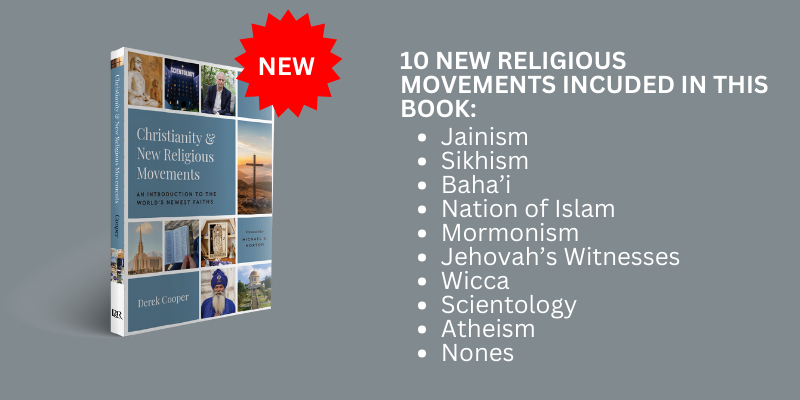The following is an interview with Derek Cooper. He is the author of Christianity and New Religious Movements: An Introduction to the World’s Newest Faiths and Christianity and World Religions: An Introduction to the World’s Major Faiths.
- What led you to write Christianity and New Religious Movements? How did you become interested in exploring this topic and critiquing it from a biblical perspective?
There are two primary factors that led me to write this book. First, I had received so much positive feedback from my previous book with P&R titled “Christianity and World Religions: An Introduction to the World’s Major Faiths.” That book explored how Christians can and should engage major world religions like Islam, Buddhism, and Hinduism. A lot of readers appreciated the spirit of that book and asked me what book I could recommend for learning about and engaging newer religions like Mormonism, Jehovah’s Witness, and Scientology. I wanted to provide a book that would fill that void.
Second, I have been interested in newer religions for most of my life. As I mention about in the book, I grew up very close to the headquarters of the Branch Davidians, a new religious movement that captured national headlines in the 1990s during the so-called Waco Siege in Texas. Those events made me aware of religious traditions that had branched outside of mainstream world religions. I wondered where they came from and why they believed what they did. As I got older and entered the academic field of religious studies, I noticed that there were not too many book resources available that taught about new religious movements in a compassionate way yet remained committed to traditional Christianity. This led me to wanting to write a book about new religious movements from a biblical worldview.
- What are the main things you learned from researching your book; what do you consider the “big takeaways” to be?
I learned a lot as I researched for this book and met with countless practitioners of new religious movements. For me, I think it’s always important to combine both theory and practice. It’s one thing to know theoretically what people believe, but it can sometimes be another thing to see what they believe practiced in real life. I’m thankful for the leaders and practitioners whose personal experiences supplemented my academic research.
One of my major takeaways is that I’m thankful for the Christian Church as it has safeguarded, preserved, and defended traditional Christianity over the course of 2,000 years. The pressure to change, to compromise, and to evolve never goes away and remains a constant within Christianity. There are literally tens of thousands of different denominations or sects that claim a Christian heritage, demonstrating how difficult it is to stay on the narrow path. As Jesus said in the Sermon on the Mount, “the gate is narrow, and the way is hard that leads to life” (Matt. 7:14). While writing this book, I was reminded of this passage often. I also realized that other religious traditions encountered a similar phenomenon. How do we hold on to something when we are constantly in motion?
Another takeaway is that there are a lot of reasons why people join new religious movements, but one common theme I encountered was that people were ultimately seeking a sense of belonging. They wanted to be part of a community that valued them and gave them a sense of purpose and kinship. This saddened me to think about how the Church has not always been a place where people feel safe and valued and loved.
- What are some important truths that you would like readers to remember from reading CNRM?
First, I would like readers to remember that people are desperately hungry for truth and meaning. The fact that so many people throughout history have sought out a relationship with God, however imperfectly, is a testimony to how much humankind is searching. This provides the Church with a real opportunity to share the message of Jesus Christ and live out our calling to love God and love others.
Second, I would like to remind readers of Jesus’s plea for us to be “as wise as serpents and as innocent as doves” (Matt. 10:16). We need to cultivate wisdom because there are plenty of wolves in sheep’s clothing. For instance, there are many new religious movements that say one thing publicly but practice another thing privately. As such, being shrewd, discerning, and wise are essential in this day and age. But as a complement, Jesus urges us to be “innocent,” which is a rarely used Greek word in the New Testament (ἀκέραιος) that could be translated as “whole,” “honest,” “gentle,” or “harmless.” A lot of people in new religious movements have beaten up and are broken, and the last thing they need is for someone else to push them down even further. There are ways of coming alongside people and helping them up in a gentle way that does not do additional damage.
Finally, I would like to remind readers of Ecclesiastes, which tells us that “there is nothing new under the sun” (Eccl. 1:9). It’s tempting to be lured into something different because it is new. It may come across as more relevant, more sophisticated, or more authentic. I can empathize with this. And to state the opposite, something is not right just because it is old. But as a Christian, my study of new religious movements has pushed me back toward the core of our classic Christian beliefs and practices, which do not change, and which are not subject to the revolving door of our constantly changing culture. In fact, we have wonderful examples from Scripture and church tradition of Christians who remained innocent with regard to the truth yet wise in relation to the world.


Comments